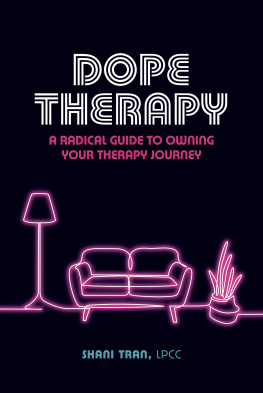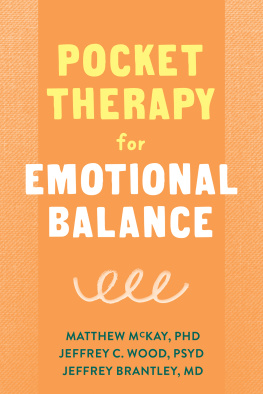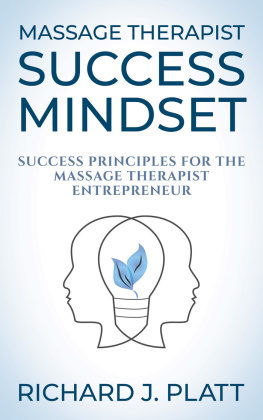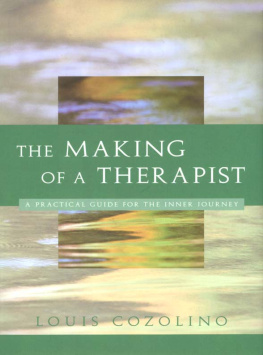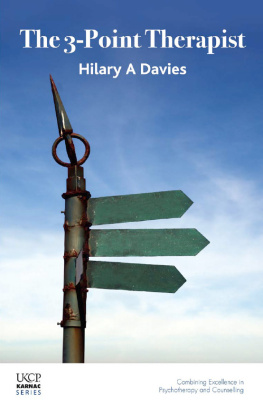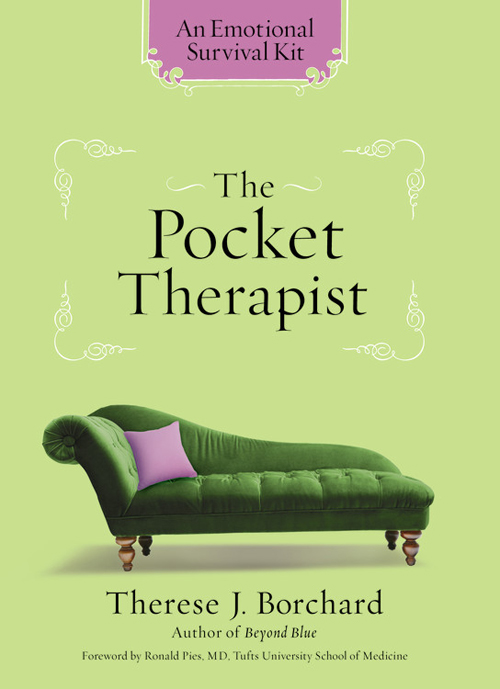To the best of my ability, I have re-created events, locales, people, and organizations from my memories of them. In order to maintain the anonymity of others, in some instances, I have changed the names of individuals and places, and the details of events.
Copyright 2010 by Therese Borchard
All rights reserved. Except as permitted under the U.S. Copyright Act of 1976, no part of this publication may be reproduced, distributed, or transmitted in any form or by any means, or stored in a database or retrieval system, without the prior written permission of the publisher.
Center Street
Hachette Book Group
237 Park Avenue
New York, NY 10017
www.HachetteBookGroup.com
www.twitter.com/centerstreet
Center Street is a division of Hachette Book Group, Inc.
The Center Street name and logo are trademarks of Hachette Book Group, Inc.
First eBook Edition: April 2010
ISBN: 978-1-59995-346-5
For my therapist, of course.
And for Mike Leach, the wisest person I know.
That great repository of spiritual wisdom, the Talmud, asks, Who is wise? and answers by stating, The person who learns from everyone. In her new book The Pocket Therapist, Therese Borchard shows that she has taken this Talmudic teaching to heart. As she notes in her introduction, she has collected nuggets of wisdom not only from her own therapeutic journey, but also from her husband, family, friends, and even the loud guy who was simultaneously eating a hot dog and shouting to the players the other day at the navy baseball game.
To her credit, Therese Borchard does not hold herself forth as an expert in mental health treatment, or as one claiming that merely reading a bookhowever helpful or profoundcan serve as a substitute for professional counseling and treatment. Rather, having grown and profited from her therapeutic odyssey, Ms. Borchard presents the reader with her sanity filethe tricks, techniques, and sound bites I use between my therapy sessions.
While Ms. Borchard would be too modest to compare her work to some of the worlds great spiritual traditions, many of her deceptively simple strategies reflect a deep spiritual wisdom. For example, when she advises, You cant sit around and wait for the storm to be over. You have to learn how to dance in the rain, she brings to mind a wonderful saying from the Buddhist master Lama Zopa Rinpoche: We should learn to love problems, like ice cream. Similarly, when Ms. Borchard advises, Catch the snowball (and toss it back), she reminds us of what the Stoic philosopher Seneca taught us: Every trouble that may come our way presses harder on the one who has turned tail and is giving ground.
Ms. Borchard is clearly familiar with many spiritual teachings found in both Western and Eastern traditions, and makes good use of them in her book. But The Pocket Therapist is not a textbook of theology or philosophy, nor does it read like one. This is a book of honest self-examination and hard-fought, practical wisdom. Ms. Borchard writes in a breezy, relaxed, and often humorous style that draws the reader in from the very first page. At the same time, her self-disclosures can often be brutally honest, as when she writes, I can be so blind to my own attempts at disguising self-destructive behavior in a web of lies and rationalizations. Many readers struggling with their emotional pain will know they have found an empathic and knowledgeable guide in Therese Borchard, as when she writes:
one of the final steps in healing our wounded inner child is learning how to stay with our loneliness: not running away from it or rushing into some activity as a kind of anesthesia. God, does that hurt: staying with the pain of unfulfilled love, expectations, and aspirations. And yet, letting the loneliness come and go as it wants, exactly how our neighborhood dog did when I was ten, is, I suspect, the single most liberating step in my recovery from depression and anxiety.
In many ways, The Pocket Therapist is a kind of field guide to getting by in the worlda world in which we often face cruelty, disappointment, and adversity. Therese Borchard has given us a treasure trove of wise parables and shrewd insights, all aimed at helping us deal with the slings and arrows of life, while being kind and good to ourselves and others. This is much more than many high-priced therapists deliver!
In the book of Proverbs (4:7), we are told, Wisdom is the principal thing; therefore get wisdom: and with all thy getting get understanding. I believe that the reader will be well served by following Therese Borchard in her courageous quest for the getting of wisdom.
Ronald Pies, MD
Dr. Pies is professor of psychiatry at SUNY Upstate Medical University, where he is also lecturer on bioethics and humanities; he is also clinical professor of psychiatry at Tufts University School of Medicine and editor in chief of Psychiatric Times. Dr. Pies is the author of Everything Has Two Handles: The Stoics Guide to the Art of Living.
Im guessing that you are too broke or busy to go to therapy. Or maybe you do see a shrink, but its never enough. You wish you had some emotional CliffsNotes to carry with you in case something really bad happens because you know its coming eventually.
If you nodded, smirked, or sighed, look no longer!
The pocket therapist is here!
Its for people who are a tad fragile, like myself, but much more interesting than the folks who never experience doubt, panic, anxiety, sadness, confusion, insecurity, or a day sponsored by Kleenex.
I have saved you oodles of time and mucho money by merely organizing all of my therapy notes into a compact little volume that you can carry in your pocket in case you run into the person who gets his giggles and kicks from pressing your TURN ME INTO A BITCH button.
Yep, just for you, I paid a visit to the Ark of the Covenant: a mammoth plastic bin in my garage that stores fifteen journals of notes from more than twelve years (i.e., six hundred hours) of therapy, two binders full of get-ahold-of-yourself tips I learned in the psych ward, and a fat folder of inspirational transcripts compiled from my twenty-one years of attending practically every kind of support group held on this planet.
Then I got even more ambitious. I asked readers on a few different websites Beliefnet.com, Psych Central, and The Huffington Postto tell me the most important lesson they learned in therapy.
What a response!
I plucked the gems from those answers and added them to the Ark. Plus any nuggets I have collected in other places: from my swami-mentor Mike Leach; my UPS guy, Dave; the woman who gave birth to me and my sisters; my wise friends like Priscilla, Ann, Michelle, and Beatriz; my husband; a few favorite authors; and the loud guy who was simultaneously eating a hot dog and shouting to the players the other day at the navy baseball game.
As I pored over my scribbled darlings and the advice from others, I said to the Ark, You are holy, indeed and its time I share you.
Why?
I have a feeling a few of my pearls might apply to you. One or two might even spare you some suffering. At the very least, youll be comforted to know that your distorted thoughts are hardly unique.
Its true that some paragraphs contradict others. You expected that from a bipolar chick, yes? The variety of quips and philosophies I compiled is meant to cover an assortment of moods. Because some days sanity means going easy on yourselfletting yourself cry for two hours as you consume the box of Godiva dark chocolates you bought for your husbandwhile, at other times, recovery entails getting off your lazy butt and jogging the four miles you promised your personal trainer you would.



